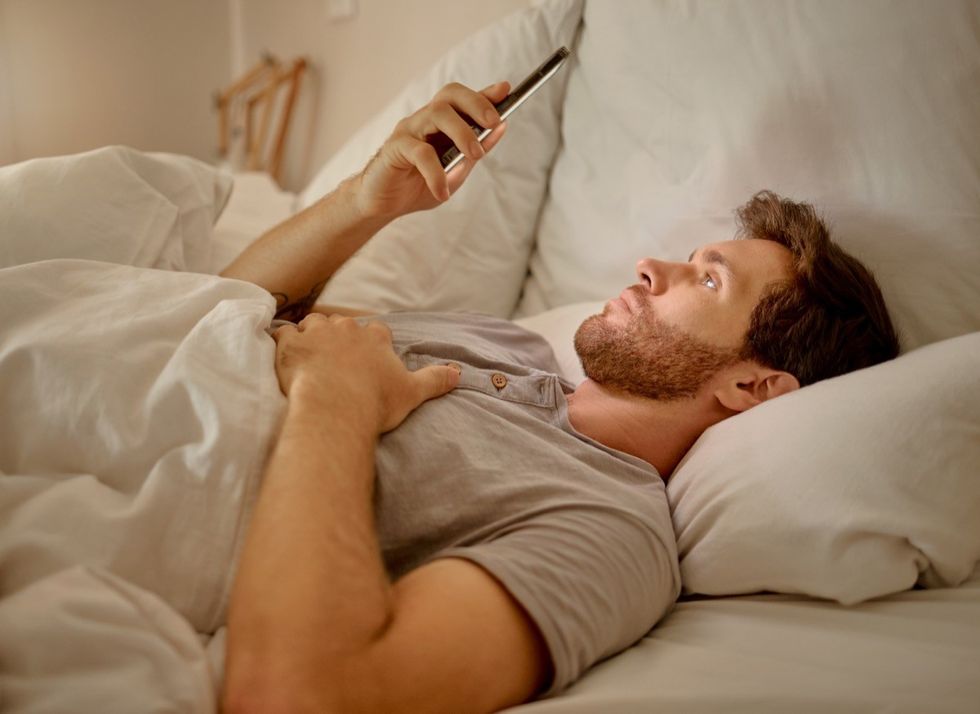If you’ve ever felt cranky after a poor night’s sleep, you know how important it is to get not only enough sleep (at least 7 hours) but good quality sleep. “Lack of sleep also impacts cognitive function, thought processes, intellectual judgment and emotions, and you may be more likely to fly off the handle,” Leonel Carrasco Abinader, MD, tells Piedmont Health. “Long-term sleep deprivation can lead to cardiovascular disease and an increased morbidity risk… Every night, your brain gives you a bill. If you don’t pay the bill, it charges interest and penalties. Your brain tells you when to go to sleep. If you don’t pay the bill, it will cut off your power, such as while you’re driving. Sleep deprivation can be very dangerous.” Here’s how doing one specific thing can instantly improve your sleep and wellbeing.
RELATED: Discover This Science-Backed Sleep Secret.
Turn Off Electronics
Shutterstock
Our smartphone habits aren’t just ruining our posture—they’re doing a number on sleep health and quality. One of the most important things you can do for good sleep is to avoid screens for at least a half hour before bed. “Bright lights signal to your brain that the sun is up and it’s time to be awake,” Dr. Abinader says. “They block melatonin secretion, which is what helps you fall asleep. In the last 30 minutes before bedtime, you should avoid watching television, using your computer and other bright lights.”
Too Much Stimulation
Shutterstock
Sleep can be impacted by screens, even if you’re watching something not too stimulating. “The light from our screens can delay our transition to sleep, even if we are engaged in some soothing activity online,” Joanna A. Cooper, MD, tells Sutter Health. “But it’s more likely that our evening texting, television shows or video games are stimulating in themselves, keeping the brain busy and wound up, and even causing adrenaline rushes instead of calm.”
Blue Light Problems
Shutterstock
The blue light emitted from electronics may be undermining the quality of rest we get. “Cell phones, computers, tablets, and televisions emit blue light from their screens,” says the National Sleep Foundation. “Blue light has shorter wavelengths than other colors in the visible light spectrum and causes more alertness than warmer light tones. Because blue light promotes wakefulness, it can have a powerful effect on the natural sleep-wake cycle, which is one of the essential circadian rhythms governing our body processes.”
Keep the Bedroom Dark

Try to protect your room from other disruptive lights. “Before clocks, people would wake up when the sun rose and go to sleep when it got dark,” says the British Heart Foundation. “Similarly, a darkened room helps to promote sleep and turning the lights down can make you feel sleepy. If you don’t have a dimmer switch, inexpensive lamps with a dimmer are a good option, or you could ask an electrician to quote for the cost of changing your main light switch. If you’re disturbed by street lights outside your window, or bright sunlight at 5am in summer, you could try heavier curtains, extra lining or investing in blackout blinds.”
Keep Electronics Out of the Bedroom
Shutterstock
A cool, calm bedroom environment is important for good sleep. “We’ve all fallen asleep with the TV on, only to be woken up later by an infomercial and a bright screen in the middle of the night,” says the National Sleep Foundation. “Pings and dings from incoming emails on your laptop, as well as text alerts and even the gentle buzz of vibration mode on your cell phone, will likely put your brain back into ‘response-mode’ and disrupt you while you’re drifting off.”




